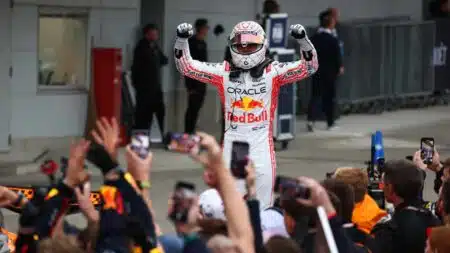
F1 snore-fest shows new cars badly needed: Up/Down Japanese GP
The 2025 Japanese GP showed a much more extreme change than next year's technical regulations is needed to make racing at classic F1 tracks interesting
The Rondeau M378 is a French machine with a British heart. Chassis #001, the focus of this week’s classified spotlight boasts a race history like no other – a history embedded into every weld, joint and nut hidden under its fibreglass body.
The thought that Porsche, Audi, Toyota or Nissan could re-use, for the next nine years, the carbon tubs that lapped La Sarthe last month is unthinkable. By 2024, the winning 919 Hybrid will be sitting in Porsche’s museum, gazed upon by motor sport fans captivated by its history and the distinctive aesthetics of present-day prototype racers. The Bamber/Hülkenberg/Tandy car might make an occasional appearance at Goodwood, but I strongly suspect its racing days will be over. Apart from anything else, the complexity of modern prototypes (particularly those with hybrid systems) makes me a little fearful for the next generation of historic racing – who will be able to run these cars in 20 years’ time?

Moving back to the subject at hand, the advances in technology and the regularity of regulation changes between now and ’24 would make any attempt to re-use current LMP1 chassis into the next decade unfeasible. Yet that is exactly the achievement of chassis #001. Between ’78 and ’88, the car pictured here competed in 10 editions of the world’s most famous 24-hour race. It is the current record holder for the most Le Mans starts and given the reasons outlined above, it is likely to retain that title for a long time to come.
Jean Rondeau, the car’s creator, holds another enviable Le Mans record. He remains the only man to win the race driving a car bearing his name and designed by his own hands. Having beaten Jacky Ickx and Reinhold Joest to the ’80 victory he must have struck a content figure leaving the circuit that evening.
Although #001 never took an outright victory at Le Mans, it did secure three class wins. It also made the overall podium in ‘80 and ‘81 with third- and second-place finishes. The car’s competitiveness dipped in the mid-80s as Rondeau’s team went under and its rivals progressed: 17th overall was the best result achieved between ’85 and ’88. However, to be anything other than star-struck by the car’s racing pedigree would be ungracious. The odd looking machine has earned a place in Le Mans history reserved for few others.

Its slightly odd proportions reveal a shape specifically designed for the challenges of La Sarthe. The car goes without a full tail wing in order to reduce drag while large fins at each rear flank improve high speed stability. The partial wheel coverings are another feature designed to minimise air resistance down the Mulsanne. Although an extreme looking machine, the M378 was originally designed to Grand Touring Prototype (GTP) rules rather than the headline Group-6 regulations (later replaced by Group C) – the domain of Porsche and Renault-Alpine in ’78. Nevertheless, it is clear that Rondeau always had one eye on overall victory with the M378.
As alluded to previously, the car is propelled by a Cosworth DFV. In endurance trim the 90deg V8 produced between 400-450bhp at the 9000-10,000rpm mark. Rondeau’s decision to use the British power plant instead of a French unit made the prospect of home grown financial support very challenging indeed. However, the use of Formula 1’s dominant engine is undoubtedly a key contributor to the M378’s performances. The units were stressed members of the tubular spaceframe chassis and mated to another British engineering success, the five-speed Hewland gearbox.
The car’s interior reflects its age with a simple wheel and an unsculpted, slightly disorganised dashboard. The wooden gear knob looks fantastic though – and just think, Vic Elford sat in that very seat in ’83! #001 is HTP approved and returned to France last year for the Le Mans Classic (see video above). The car is currently listed as POA with Belgium-based classic car specialists RMD. I look forward to revisiting #001 when it has a further nine Le Mans Classic starts to its name.

The 2025 Japanese GP showed a much more extreme change than next year's technical regulations is needed to make racing at classic F1 tracks interesting

Max Verstappen looks set to be pitched into a hectic, high-stakes battle for F1 victories in 2025, between at least four teams. How will fans react if he resorts to his trademark strongman tactics?

Red Bull has a new team-mate for Max Verstappen in 2025 – punchy F1 firebrand Liam Lawson could finally be the raw racer it needs in the second seat

The 2024 F1 season was one of the wildest every seen, for on-track action and behind-the-scenes intrigue – James Elson predicts how 2025 could go even further